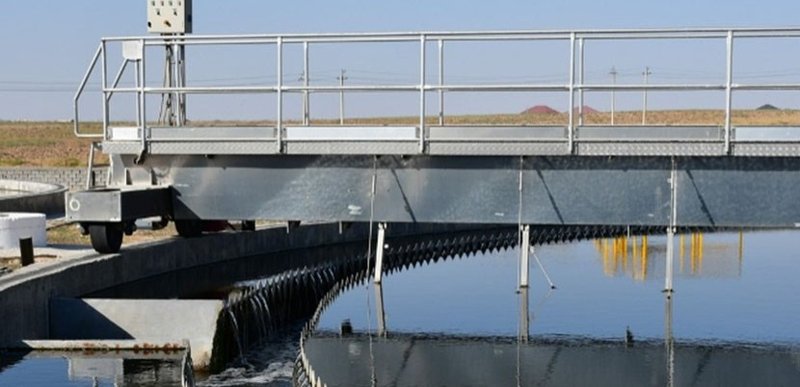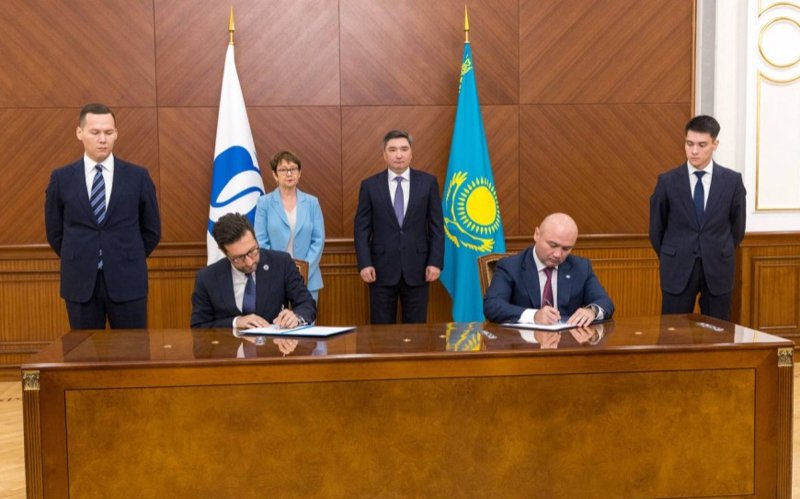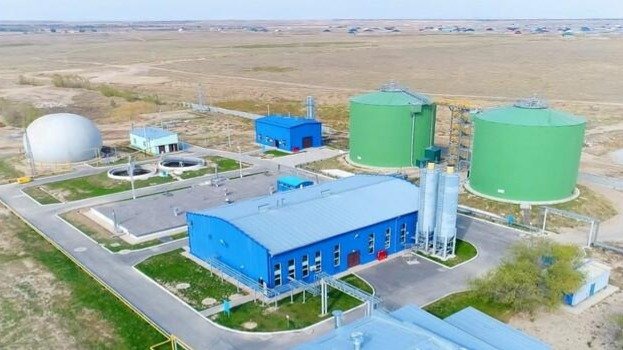Kazakhstan can build on its natural resource expertise to develop critical raw materials - EBRD President
As Central Asia seeks to strengthen economic stability and respond to climate risks, international development banks are adapting their strategies in the region. In an exclusive interview with Kazinform, EBRD President Odile Renaud-Basso discusses the bank’s engagement in the country and broader Central Asia. The discussion covers support for Kazakhstan’s sustainable development, economic inclusion, and cross-border cooperation.

What are the key priorities of the EBRD in Kazakhstan for the coming years, especially in the context of global economic instability?
— The global landscape has shifted significantly in recent years, with geopolitical tensions affecting trade patterns and foreign direct investment flows worldwide. While this creates global disruptions, some countries, particularly in Central Asia, can stand to benefit from the re-routing of supply chains. To date, the EBRD has invested more than €11 billion in 340 projects in Kazakhstan. As the country’s leading institutional investor, we want to support Kazakhstan in further leveraging new opportunities. To foster foreign investments, we have helped to set up the Foreign Investors’ Council, a platform for dialogue between foreign investors and the authorities, co-chaired by President Tokayev.
Growth of economies in the Central Asian region, including Kazakhstan, has long been ensured by the export of raw materials. However, low carbon transition is reshaping the demand for hydrocarbons. As many countries are transitioning to renewable energy and green economies, Kazakhstan can build on its natural resource expertise to develop critical raw materials. But it should also diversify its economy. At EBRD, we are helping Kazakhstan develop its private sector and build sustainable infrastructure, as well as decarbonise and digitalise its economy.
In 2022 the Board of Directors of the EBRD approved a five-year country strategy for Kazakhstan, which was developed in close cooperation with the authorities. It is based on the following three pillars: fostering private sector competitiveness, connectivity, and strengthening economic governance; supporting Kazakhstan’s green pathway to carbon neutrality and climate resilience; and promoting economic inclusion and gender equality through private sector engagement.
As you know, the government of Kazakhstan has adopted a National Infrastructure Plan (NIP) until 2029, which includes projects in energy, transport, digital, and water infrastructure sectors. The EBRD is already actively contributing to this plan by financing major sustainable infrastructure projects, such as the Aktobe wastewater treatment facility, and strengthening electricity system resilience by interconnecting the West Kazakhstan Power System with the rest of the country.

In the next five years, the EBRD is committed to supporting the country with at least €2 billion of financing aimed at the modernisation of energy and utility services infrastructure and to mobilising additional financing for this purpose. In addition to projects under NIP, we are helping to develop public-private partnerships to mobilise private sector investments into energy, urban transport, healthcare, and education infrastructure.
Regional trade within Kazakhstan, across Central Asia, and beyond will greatly benefit from the upgrade and expansion of the Transcaspian Transport Corridor (TCTC). We firmly believe that Kazakhstan is an important part of this intra-regional connectivity initiative. The country should upgrade its connector roads and railways, modernise border crossings, and eliminate unnecessary barriers to trade and transportation within the region. In this respect we are actively supporting state-owned and private companies providing transportation and logistical services along the TCTC.
During my recent visit to Kazakhstan at the end of June 2025, we signed an agreement with the national road operator KazAvtoZhol to finance the reconstruction of a 234 km section of road in Western Kazakhstan. It will transform the single-carriageway category-II road into a dual-carriageway category-I road, improving a stretch of strategically important motorway that is part of the Western Europe-Western China corridor.

The EBRD is also an active actor in renewable energy and storage projects, strategic for the country’s energy transition. Beyond domestic transition, Kazakhstan can leverage global opportunities in low carbon space. The demand for critical raw materials (CRMs), needed for wind turbines, solar panels, lithium-ion and electric car batteries, etc., is expected to rise significantly by 2040. The EBRD is supporting EU-Kazakhstan cooperation on CRMs by helping to develop promising deposits and modernising the documentation system for geoscientific documents, maps, and data. Transparency can attract investors and can create financial opportunities and jobs for the country. Our investment in the Sarytogan graphite deposit in the Karaganda region is a good example of such work.
Beyond energy, infrastructure, and CRMs, we are helping Kazakhstan to diversify its economy by supporting private sector investments. There can be no resilient or sustainable economic growth and quality job creation without strong local enterprises. As such, the EBRD is providing financial and advisory support to local SMEs through our partner banks in Kazakhstan. We are also working with the financial regulator to support the modernisation of Kazakhstan’s banking legislation and improve real-economy lending and enable digital financial solutions. Better transparency, integrity, and regulation of the country’s financial sector will bring more investment into the sector, making it more sustainable and competitive.
How does the EBRD plan to support projects under its Green Economy Transition Approach in Kazakhstan? Are you planning to finance projects not only in major cities but also in the regions of Kazakhstan, where environmental issues and access to clean energy are particularly pressing? How does this approach align with Kazakhstan’s goal of achieving carbon neutrality by 2060?
— In 2024 the EBRD more than tripled the volume of its annual investment in Kazakhstan by signing 25 projects worth €913 million (US$935 million). 61% of the investments were aimed at supporting green economy projects across the country.
With almost 3 GW of installed renewable capacity as of spring 2025, Kazakhstan has made remarkable progress in renewable energy, increasing its share from zero a decade ago to more than 6 percent now. About a third of that increase was financed by the EBRD. We are also helping Kazakhstan with the implementation of its long-term low GHG emissions development strategy and Global Methane Pledge. Further decarbonisation of the economy will require accelerating the rollout of the renewable auctions with battery storage.
Jointly with our partner banks, the EBRD is rolling out its Green Economy Financing Facility (GEFF), which is designed to promote the use of renewable energy sources and help companies and households in the country reduce energy consumption. The funds under GEFF are helping local micro-, small-, and medium-sized businesses and households, even in remote parts of the country, to improve their climate resilience and adaptation, reduce pollution, and promote the sustainable use of water.

How does the EBRD plan to support the development of small and medium-sized enterprises (SMEs) in Kazakhstan, especially in remote areas?
— The EBRD’s SME Finance and Development activities in Kazakhstan help businesses in various industries to access business advisory and other non-financial services and knowledge products under the framework of its Advice for Small Businesses program. Targeted outreach focuses on nurturing high-growth-potential industry champions but also on supporting other SMEs and deploying tools to serve micro and small businesses.
EBRD also finances SME development through risk-sharing agreements (RSF) with local partner financial institutions. This helps us to reach out to smaller and more remote clients, supporting the real economy. Since 2020, the amount of RSF transactions has reached almost €21 million.
Since 2001, almost 4,000 Kazakh SMEs have had access to business advice and industry expertise. Since 2015, over 20,000 entrepreneurs have also benefited from various non-financial services such as training, seminars, and networking opportunities. Additionally, nearly 200,000 entrepreneurs were reached digitally with educational business content.
According to our assessment, nearly 70 percent of small enterprises that received our support are located outside of Almaty and Astana, and more than 50 percent of supported companies are women-led. Thanks to the EBRD support, local SMEs have created more than 9,800 new jobs since 2015.
The Advice for Small Businesses program is supported by the government of Kazakhstan, and this cooperation has recently been extended for another five years. With the new agreement in place, the program will specifically target medium-sized enterprises with high growth potential to help them attract external investment and develop industry champions.
How can cooperation between Central Asian countries on water resources and climate resilience be strengthened with the involvement of the EBRD?
— Every fourth inhabitant of Central Asia, home to more than 83 million people, does not have regular access to safe drinking water. The World Resources Institute forecasts that an additional one billion people globally will live with extremely high water stress by 2050. This will disrupt economies and agricultural production. Most Central Asian countries will be severely affected.
While the EBRD cannot reverse the global warming process or tackle its impacts alone, it can certainly contribute to climate change mitigation efforts by securing better access to water and improving water management and promoting its rational use. Most municipal water supply and treatment utilities in Central Asia have not seen much investment or refurbishment over the last 30 years, and rural areas in the region often have no water supply or water treatment.
The EBRD has been working to address these issues through investment and technical assistance support. In June, our bank provided a sovereign loan of US$ 250 million to the Ministry of Water Resources of Uzbekistan for upgrades to 110 pumping stations used for irrigation systems in 10 regions of the country. As part of our strategic commitment, we continue to invest in this important sector for Uzbekistan, which depends on irrigated agriculture.
In Kazakhstan, we showcased how empowering the private sector can modernise water services.

Over many years, we supported the country’s only privately owned municipal utility in Shymkent to provide high-quality water services to the city’s more than 1.2 million residents. Vodnye Resoursy Marketing, or more widely known as the Shymkent Water Company, has become a benchmark for the region for its effective and efficient operations and an illustration of what private-sector involvement can achieve in the provision of municipal services.
In the Kyrgyz Republic, we have to date helped ensure safe access to water across 26 municipalities by modernising municipal services, reducing water losses, and strengthening the climate resilience of municipalities across the country. By covering the densely populated Fergana Valley and Osh regions, the projects have made a systemic impact in the country.
In Tajikistan, we helped deliver clean water in 21 municipalities, helping to improve the population’s living and sanitation standards even in remote mountainous areas. Climate-resilient and sustainable infrastructure deployed via our projects will serve the country for many years.
The EBRD is also helping to upgrade the existing hydropower plants in the region to improve their efficiency, increase climate resilience, and help them adapt to changing water flow levels. One such project is the rehabilitation of Chakan HPP near Bishkek. Our largest investment in the hydropower sector of the Kyrgyz Republic in 20 years will improve the HPP’s productivity and help increase its annual electricity output by 56 percent.
I would also like to mention the Kambar-Ata Hydroelectric Power Plant project as one of the telling examples of regional cooperation. Developed as a trilateral joint venture between Kyrgyzstan, Kazakhstan, and Uzbekistan, it is attracting financing from the World Bank, the ADB, the EBRD, the AIIB, and other international financiers. When completed, it will be one of the largest hydroelectric projects in Central Asia. Beyond energy benefits, the Kambar-Ata HPP dam will enhance seasonal water management and irrigation capacity in Central Asia, reinforcing regional cooperation. We look forward to working with local and international partners to support infrastructure projects in the region to ensure quality services to the people and effective resource use.
Earlier, during her meeting with President Kassym-Jomart Tokayev, Odile Renaud-Basso reaffirmed the EBRD’s commitment to supporting the country’s infrastructure and green transition projects.
